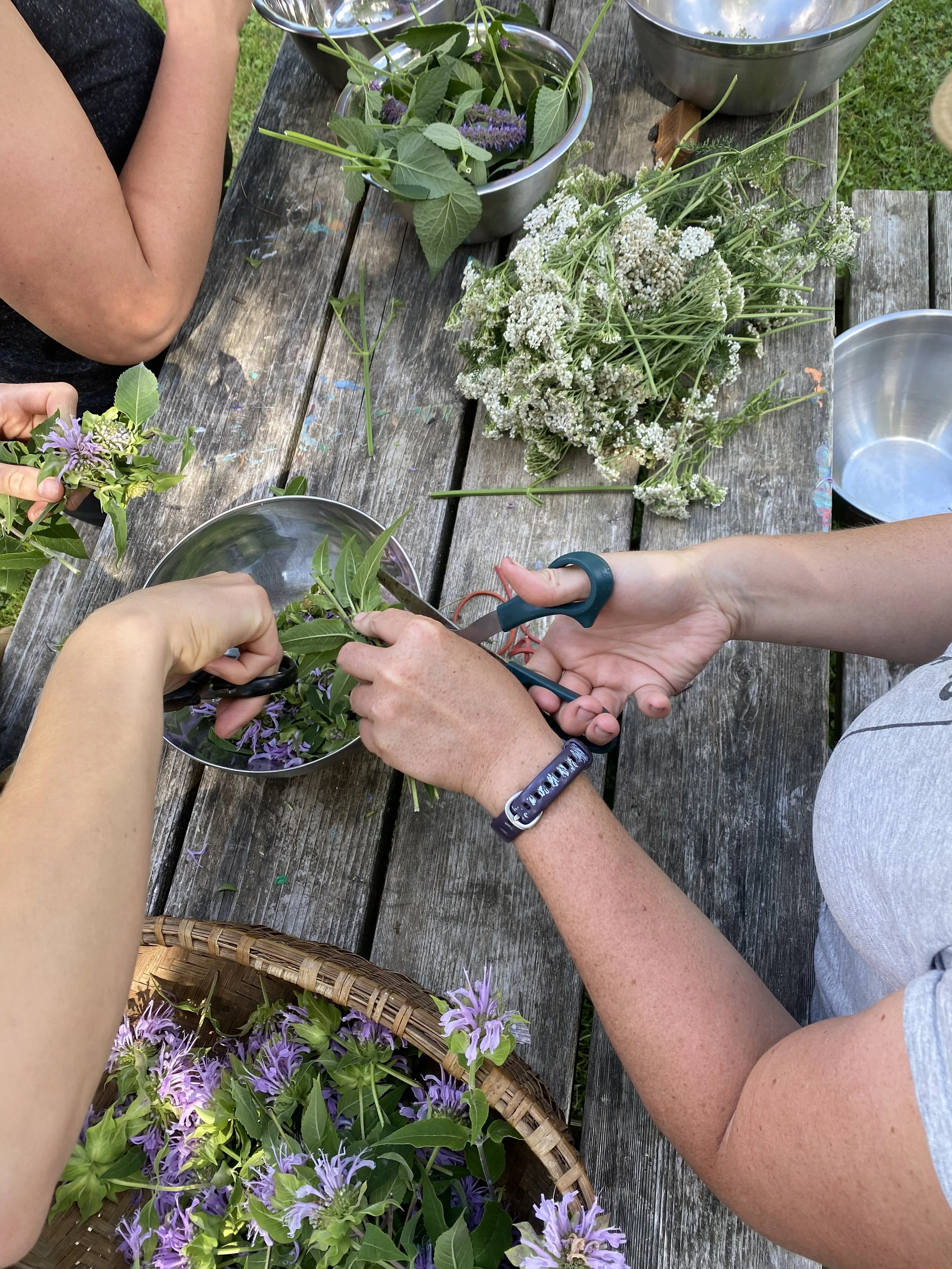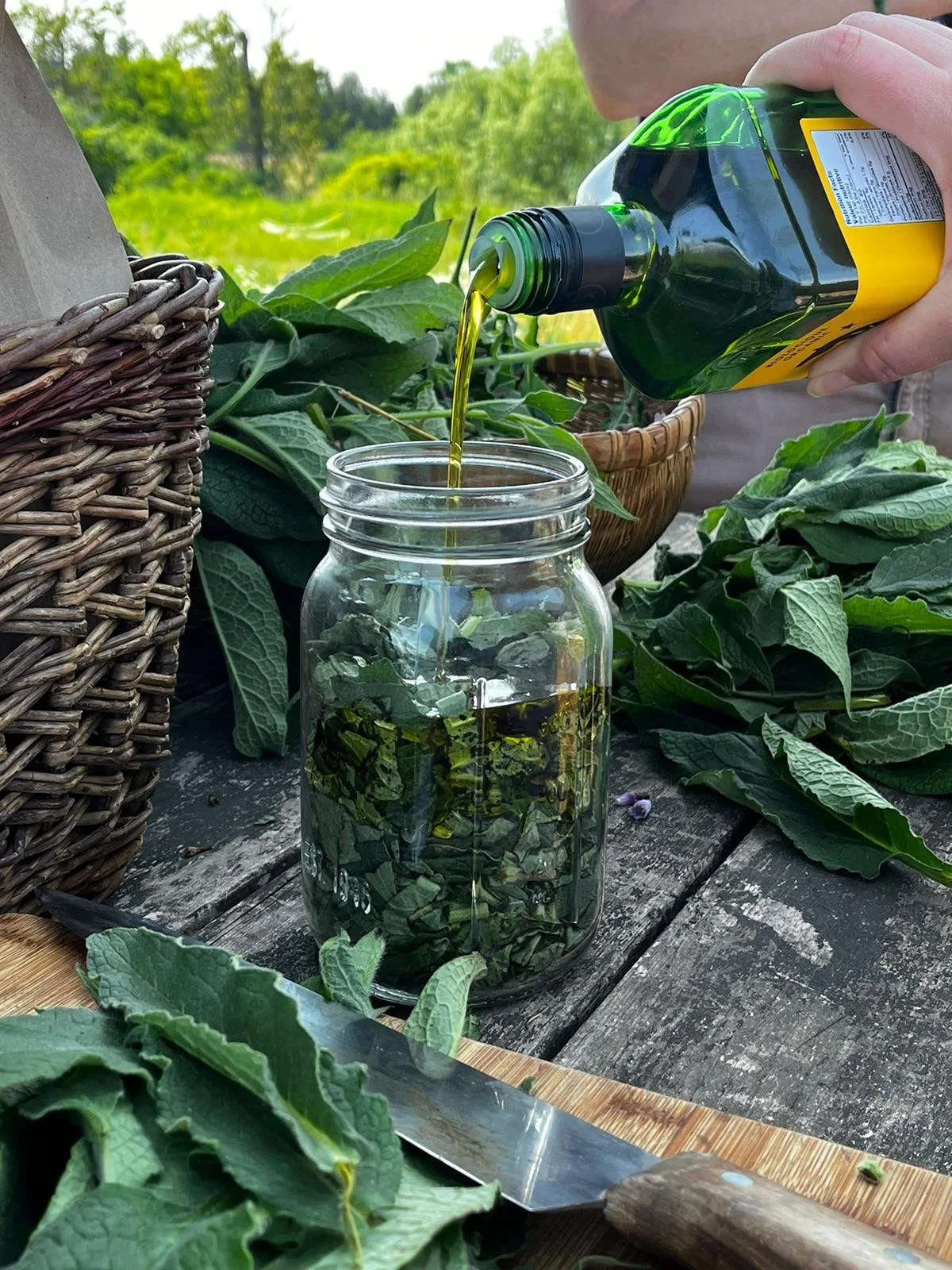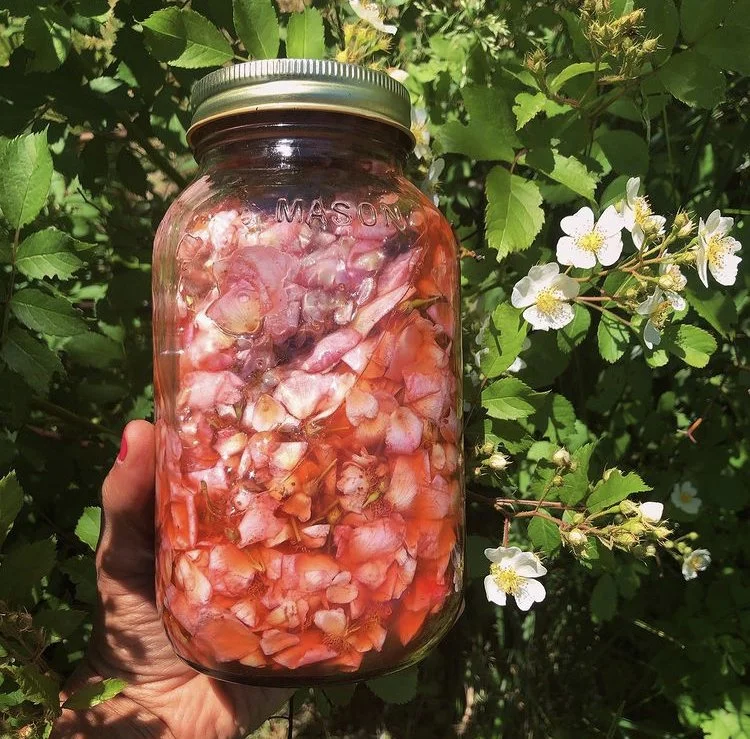
Flower School: Plant Medicine Immersion Series
June - September, 2025
Plant medicine for building relationships with our bodies, the land, and each other
Flower School Plant Medicine Immersion is an embodied, hands-on exploration of the theory and practice of herbal medicine. This program is designed to offer beginner and intermediate herbalists 30 hours of direct experience in the full spectrum of herbalism, including cultivating herbs, herbal therapeutics, medicine making and plant ecology. New for 2025: sign up for the full program at a discount, or register for individual sessions according to your interests. See registration info below.
Flower School takes place on Eramosa Herbals’ vibrant one-acre herb farm that is home to over sixty species of edible, medicinal and utilitarian plants. In six sessions over the course of the growing season, we’ll get to know cultivated and wild plants and experience their application in herbal medicine. We’ll tend diverse gardens that are home to an abundance of plants and pollinators, harvesting and processing plants for a variety of preparations. We’ll dive deep into focused study of the properties, energetics and therapeutic actions of our focal species. We’ll explore the connections between medicinal plants and local ecology by identifying wild plants in the wetlands and forests of our bioregion. Guest instructors will join us to share practices for building relationships with land through ecological and artistic perspectives. See session details below.
Herbal medicine is the practice of using plants for self and community care, rooted in the understanding of our bodies as ecosystems that are part of natural world. In Flower School, we’ll explore plant medicine as technology for our collective wellness, weaving together theory and experiential knowledge with reverence and care for the more-than-human world.
In this program, participants will:
Gain a working knowledge of 16+ key herbs used in Western herbalism
Study clinical applications of herbs to different body systems
Gain hands-on experience in the full spectrum of herbal medicine, including cultivating, harvesting and preparing herbs
Learn to craft medicinal preparations with clinical and “folk” methods, including tinctures, teas, infused oils, salves, syrups and more
Build their home apothecary with homegrown herbal remedies
Learn foundational field naturalist skills like plant identification, basic botany, and ecological relationships
Build deeper relationship with the more-than-human world
Flower School is for those looking for:
Herbal studies guided by land stewardship and reciprocity
In-depth knowledge of how to use herbs to support wellness
An approach to herbalism that weaves together deep respect for science, traditional knowledge, and embodied ways of knowing
Hands-on learning in a supportive, small group setting
Session dates and details at a glance
Flower School sessions are crafted to tap in to the seasonal cycles of the herb gardens and the surrounding landscape. Each session will include experiential activities, hands-on projects and in-depth discussion of the properties and applications of our focal species.
Session 1: Bioregional Herbalism & Herbal First Aid | Sunday, June 15, 9 am - 2 pm
Spring plant walk with an introduction to plant medicine and local ecology; herbal first aid preparations. Focal species: Plantain, comfrey, St. John’s wort, willow
Session 2: Herbs for Digestion | Sunday, July 6, 9 am - 2 pm
Using herbs to support the digestive system; herbal honeys and vinegar preparations. Focal species: anise hyssop, tulsi, chamomile, elderflower
Session 3: Herbal Tinctures and Oils | Sunday, July 27, 9 am - 2 pm
This class will focus on herbal extraction principles and methods, including tinctures, oils, infusions and more. Focal species: calendula, lavender, bee balm
Session 4: Herbs for the Nervous System | Sunday, August 17, 9 am - 2 pm
Embodied herbal energetics; using herbs to support the nervous system. Focal species: skullcap, passionflower, lemon balm
Session 5: Root Medicine & Botanical Colours | Sunday, September 7, 9 am - 2 pm
Using herbs to support the respiratory and immune systems; harvesting and processing roots; botanical dyeing and eco-printing with guest instructor Jen Britton. Focal species: goldenrod, aster, mullein, elecampane, marshmallow
Session 6: Medicine Making | Sunday, September 21, 9 am - 2 pm
Medicine making intensive! In our final session, we’ll meet in a local kitchen to process plants we’ve worked with over the summer into salves, syrups, tinctures and more.
Location
Classes take place at Eramosa Herbals’ one-acre site at the Ignatius Community Farm, just outside of Guelph on Highway 6. We’ll spend the majority of our time studying and working with the herb gardens, and we’ll also get the chance to explore and identify wild plants in the forests and wetlands surrounding the farm.
Accessibility
Eramosa Herbals is a short 7-10 min walk from the Loyola House parking lot. The terrain is gently sloped with one short, steep hill. Our site is rustic, with a nearby outhouse, and a hoophouse and market tents for shade and shelter. Classes take place rain or shine, but may be rescheduled in case of dangerous or unpleasant weather.
Towards Reparations and Repair
In acknowledgement of the ongoing theft of Indigenous lands and knowledge, and in solidarity with the preservation and resurgence of traditional knowledge and lifeways, 10% of proceeds from this program will be redistributed to Giwaabamin herb clinic in Tkaronto, Ontario.
Register here
Program fee: The fee for the 6-session series is $425-660 sliding scale, with a $100 deposit required to hold your spot. The fee for individual sessions is $75-100, sliding scale. All materials are included. Reduced rate spots are available for economically marginalized folks. Payment is processed by e-transfer. Please email eramosaherbals@gmail.com with any questions.




